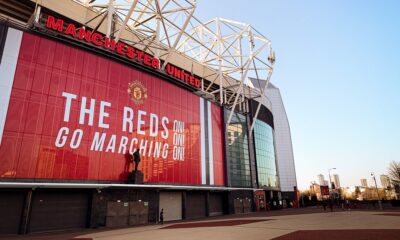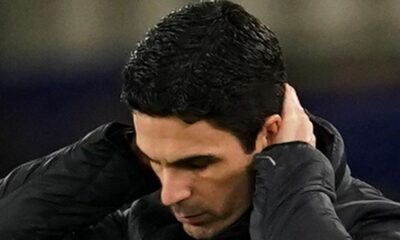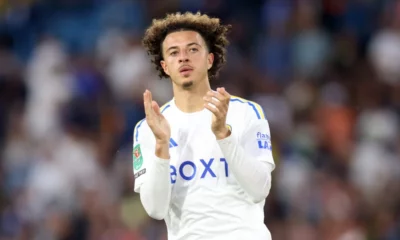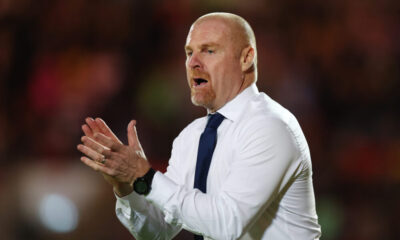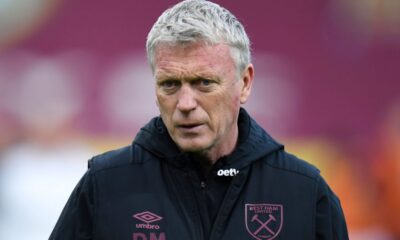Other Football News
Reasons To Be Cheerful – why England fans can look forward to South Africa without expecting glory
By Phil Dickinson.
I don’t know about you, but I’ve already got barbeques, beer gardens and international football on the brain.
Maybe it’s systematic of my own club, Liverpool’s depressing demise. Now that last year’s relentless steam locomotive has now become like a dismantled Hornby train set, the Fat Controller still clinging to his “Book of Facts”, it seems as though I’m already thinking about what the summer might bring. It will inevitably bring us the nineteenth FIFA World Cup, complete with the public’s usual fantasizing and the hysterical patriotism of the tabloid press.
Fans of the Premier League’s “Big Four”, particularly Liverpool and Manchester United supporters, have in the past been accused of not caring enough about England and of outwardly putting “club before country”.
I must admit, I have found following England hard at times. International breaks so often deprive us of our usual spell-binding Premier League weekends and mid-week friendlies are typically drab, lacklustre affairs, matches in which the manager is normally caught between forging a settled side and bedding in fringe players.
And shamefully, as Mladen Petrić sent Steve McClaren’s England side crashing out of Euro 2008, I let out a spontaneous cry of laughter. It was the kind of laughter I have never, and never would, resort to on watching Liverpool concede a crucial goal.
In the end, watching Euro 2008 without England’s self-destructive red cards and soap opera penalty shootouts was a strangely refreshing and stress-free experience. Coming in from a kick about in the mid-afternoon sun to watch Xavi, Iniesta and company take apart opposition defences was an utter joy.
So what is this then? Is this the Merseyside turncoat swapping his Liverbird for the Three Lions? Is this the mercenary trading in the Spanish waiter’s promise of a Premier League title for a shot at international silverware? Had enough of supporting Spain?
In the end, my own longing for FIFA’s South African festival of football is less about a clear switch of loyalties and more about a simple desire to start enjoying the spectacle of the beautiful game once again. However tedious qualifying and friendly matches can be, month-long international tournaments are the pinnacle of entertainment for football fans.
The big question for English viewers is, will England’s participation bring more joy than pain this time around? Like children taking cover from the deformed foes of Dr. Who, will we once again be reduced to hiding behind our sofas as our stars fail miserably from 12 yards?
THE CAPELLO FACTOR
Most observers of England will be happy to admit that a lot has changed for the better under Fabio Capello. Unlike Steve McClaren, who isn’t exactly a cult figure at Middlesbrough, Capello has a proven pedigree as a manager, having successfully managed AC Milan, Juventus, Roma and Real Madrid. Unlike Steve McClaren, whose idea of imposing his will on the team was simply to drop David Beckham, Capello has got England suited, booted and knowing their place. And, most importantly of all, the Italian doesn’t have his side controlling and moving the ball around the pitch like a band of malfunctioning Daleks.
Just being better than Steve McClaren won’t be enough in the World Cup though. Capello has shown more than that. There is a fear in the squad now. It’s a healthy fear though. It’s not the same fear that has seen countless Lion Hearts buckle at the vital moment in the past. They respectfully fear the manager before the backlash of public and press. It’s that fear that has propelled England comfortably, professionally, but not spectacularly, to South Africa.
When Capello called John Terry to meet him at Wembley at the start of February, you can bet Terry was worried. To me, it had the feeling of a Headmaster calling a disobedient Head Boy to his office and, putting his cane to one side, calmly and coolly stripping him of his ceremonial gown. Maybe fearing more punishment that he got in the end, Terry has been forced to knuckle down and brave the boos. Although, his recent form for Chelsea has raised concerns.
While the whole Terry-Bridge affair hardly strengthened England’s World Cup bid, it at least gave Fabio the chance to show what kind of manager he is – He’s bold, uncompromising and demands professionalism. He’ll also demand that the squad pull together and fight for the cause come June. The man himself was confident enough in his own managerial ability to allow Terry and Bridge to continue co-existing in the same squad, even if Bridge was respectfully, and understandably, unwilling to give such a scenario a chance.

Whatever the state of the squad physically when the World Cup starts, I think England fans can expect to see a much more focused side than they have seen taking to the pitch in tournaments gone by, and a side that feels as much a duty to the manager and fellow team mates as to the expectations of the nation at large.
As soon as England touchdown at their Austrian training camp on the 17th of May, I think we’ll really start to see the Italian work his magic. It’s often difficult for international managers to make their mark on squads during broken up qualifying campaigns. Capello has already made a mark but, I think we’re all hoping that his tactical experience and ability to forge team spirit will come to the fore when the squad train with each other for an extend period ahead of South Africa.
PLAYERS & FORM
This is where the disunity of the nation best displays itself. Nobody it seems can agree on just how good this set of England players really is, either on paper or in practice.
Terry too slow? Ferdinand not brave enough? Lampard and Gerrard only interested in their clubs? Johnson defensively suspect? Heskey being unsuccessfully treated for chronic goalaphobia?
Personally, I think there’s plenty of quality there. In Rooney, Lampard and Gerrard, England have a goal threat that will worry opposition managers. Cole and Johnson provide good attacking width as full backs. And while unleashing Lennon and Walcott down the right may sometimes resemble greyhounds aimlessly and frantically pursuing the uncatchable electric rabbit, their pace will keep full backs very busy.
All in all, I think England have a squad which directly reflects the obvious strengths of the Premier League – physically strong, tactically aware and potentially explosive.
The problem England have is the one they seem to have before every major tournament – injuries to key players. Cole, Lennon and even Rooney have injuries of varying severity to overcome. It is difficult to see how England can last in the tournament without those 3 players, particularly Rooney, who is clearly in the form of his life.
If Ashley Cole and Rooney do manage to prove their fitness, the next worry will be the form of Terry and Gerrard. It would be asking a lot for every man in the squad to be at his absolute best on the back of a long Premier League season, but the fact that it’s certain key players, former and vice captains, that are suffering lapses in confidence is an obvious concern. Even the normally dependable Matthew Upson has looked a shadow of his former self this year, raising the issue of where England turn if Terry and Ferdinand aren’t available.
The form of the likes of James Milner, Leighton Baines and, earlier on in the season, Jermaine Defoe is more encouraging, but the early months of 2010 have certainly dragged up quite a few ‘ifs’, ‘buts’ and ‘maybes’ that Fabio Capello could have done without.
Regardless of the fact that football time and time again proves that it is a team game and not a game of individual personalities, England fans will point relentlessly to the form of Wayne Rooney as evidence for England’s ability to triumph in South Africa. Realistic England fans will rightly highlight that Rooney can’t do it on his own; his current form is supported and facilitated by a very efficient Manchester United unit around him.
But if Messi, Torres, Ronaldo, Drogba and Rooney are currently the world’s most feared attacking weapons, we all have to be buoyed by the fact that one of those weapons is English. England have always had good players going into World Cups, but whether they have had one of the 5 very best players in world football is debateable.
THE OPPOSITION
The thing that most gives me hope as we approach South Africa is the standard of the opposition England will be up against.
It is a depressing fact that England normally fall at the first “proper” hurdle, crashing out to the first reputable opposition they face – Argentina in 1986, Germany in 1990, Argentina again in 1998, Brazil in 2002 and Portugal in 2006. But to me, the standard of the so-called reputable sides is nowhere as strong as it has been previously, a number of nations have big question marks next to their names, even more so than England.

Argentina’s Diego Maradona may have been one of the finest players ever to play the game, but his management style resembles a neurotic chef angrily setting fire to his own kitchen. Argentina fans are surely hoping Diego leaves his rifle at home in Buenos Aires.
Ramon Domenech will probably be leaving France’s progress in the hands of star signs and cosmic forces, like some absurd Mystic Meg character. The French, led by wannabe basketball player, Thierry Henry, were mercilessly booed by their own crowd at the Stade de France against Spain recently and, as the Irish will remind us, they are very lucky to be going to South Africa at all.
Italy are in danger of needing to take shipments of Zimmer frames and Werther’s Originals; Centre back Fabio Cannavaro might end up playing in his slippers rather than his boots.
Carlos Queiroz’s Portugal qualified by the skin of their teeth this time around, and could find their chances imploding should star man, Ronaldo throw one of his increasingly common, and increasingly violent, tantrums.
And although Germany almost always give a good account of themselves, the German squad is ever gradually becoming quite an obscure list of relatively unknown Bundesliga names. Even Germany’s most exciting attacking talent in their previous 2 international tournaments, Lukas Podolski, named the World Cup’s Best Young Player in 2006, has recently struggled at club level, falling out of favour at giants Bayern Munich and returning to his now relegation threatened old club, FC Köln.
Ok, so some of that reasoning is wildly facetious, some of it wishful thinking, and maybe Germans, Frenchmen and Argentines are looking at the John Terry situation and being similarly dismissive of England’s chances, but still, I think England have even less to fear than they have in the past. If Capello comes up against a Domenech or a Maradona, I will be backing him to outthink his opposite number.
Spain, Holland and Brazil are all major threats though, and if England face them they will have to up their game and hope the chances fall their way. England have not fared well against these sides in recent friendlies, and some would argue, those friendlies have been Capello’s only games against truly testing opposition. But this is tournament football – momentum could count for a lot.
MODEST EXPECTATIONS
The anticipation will undoubtedly build in the coming months. It won’t be long before the Red Tops have convinced their readers that this is England’s year and that football IS coming home. Just like 1998, 2002 and 2006, everyone will be in the pub, half cut and wailing Vindaloo and Three Lions.
Looking back to previous tournaments, I believe it has been the weight of expectation that England have always failed to cope with. The better the crop of players and the more fanatical a nation is about its football, the more a nation’s success comes down to the ability to ignore what’s being said and just play.
Hence why the penalty shoot out – a series of moments in which the anxiety of the entire nation is boxed up and placed on the shoulders of single individuals while they perform one of the simplest tasks in football – becomes such a massive problem.
England’s campaigns in these tournaments have, to me, always began as end-of-season “school trips” for players – the lads on tour: WAGs in tow, catching some rays and seeing the sights. At least, that’s what it has sometimes felt like. And the mood seems to shift too quickly – as the rounds progress the players suddenly start feeling the intense pressure, the adrenaline driving them to a combination of warrior like bravery, hot-headed stupidity and uncontrollable nervousness.
Unfortunately, that pressure is always going to be there. Even if they don’t read the papers or watch the TV, if they are tempted to, they’ll be able to imagine the scenes at home. They know what the nation wants and expects. The only way to overcome that is to ignore the implications of every action out on the pitch and to perform for yourself, your team mates and your manager rather than the nation at large. Put the ball in the net and ask questions later.
Easier said than done, of course. But if anybody can get England players in the right frame of mind, professional from the outset and not inhibited by the wrong type of fear, Capello is the man. Believe me, Capello wants to do well at the World Cup, first and foremost, for himself and his own pride, and not for the “English nation”. He’ll be trying to get that attitude instilled in his players.
I’ve now realised that the best way to ruin your enjoyment of an international tournament is to make your nation’s success in that tournament the be all and end all. We all want England to do well, but this great coming together of the world’s finest players, all crammed into one intense month of football overdose, only comes once every 4 years. It’s easy to reduce your building excitement for this great event to one blood vessel burstly stressful kick from 12 yards.
I’ll just be doing my best to enjoy the feast of football on offer in South Africa and hoping England give a good account of themselves at every stage. I’m pretty certain Fabio’s men will be a model of professionalism this time around and, in the end, they might surprise a few.




